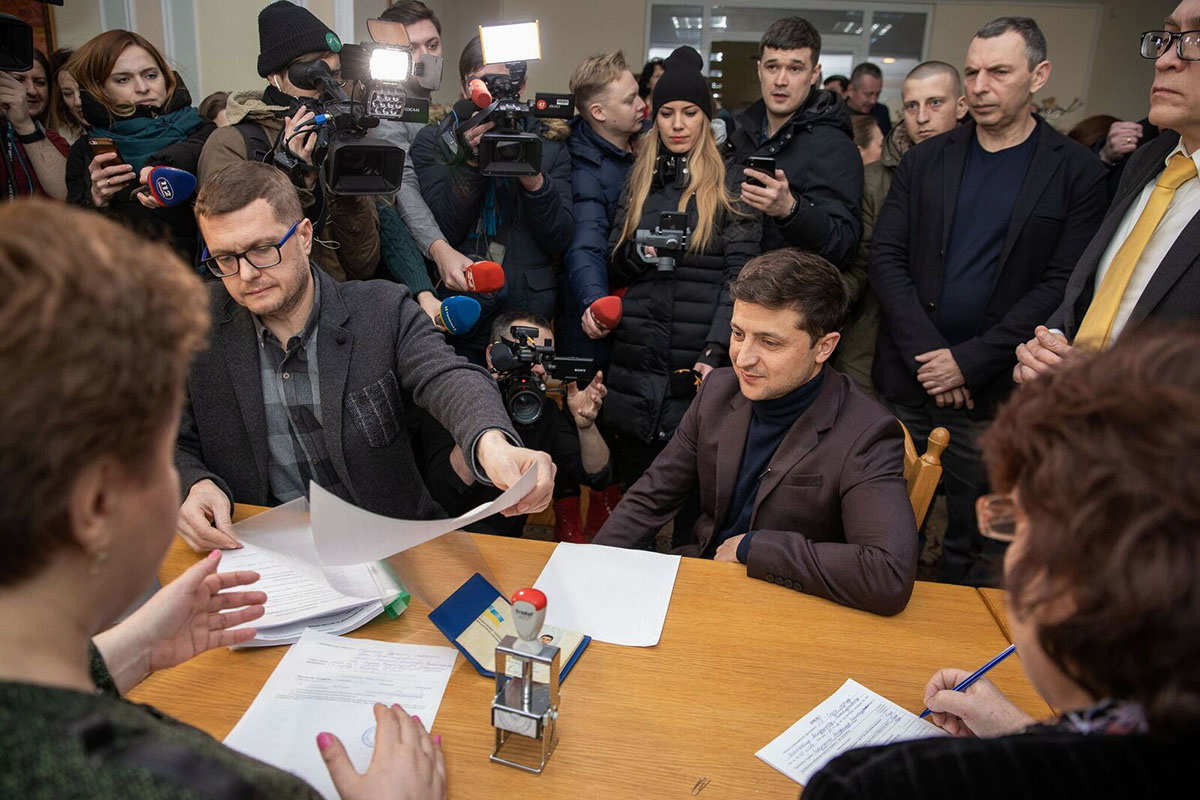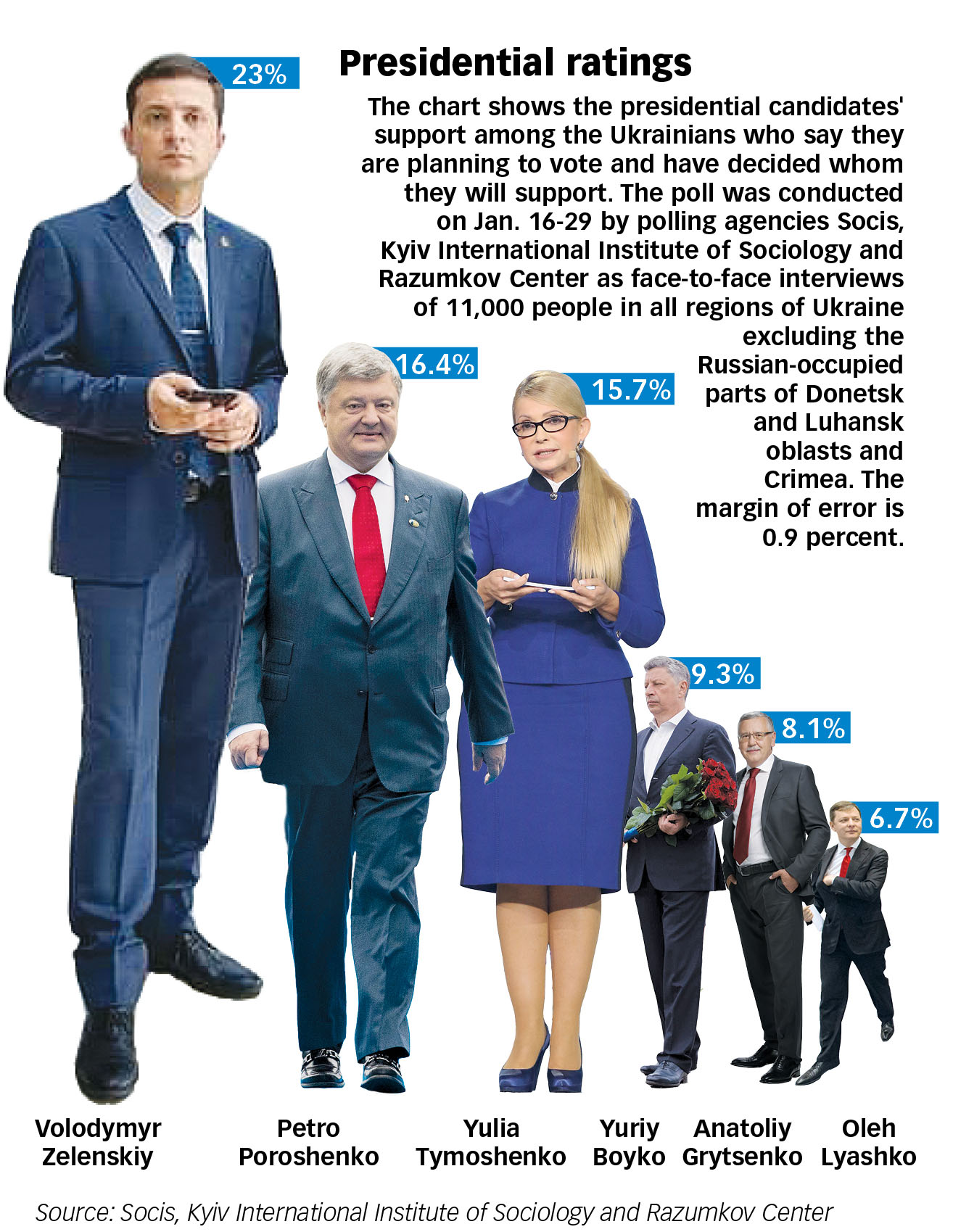The registration period for candidates is coming to an end, and the first polls of the year are out. Now the race is heating up.
Candidates in
During the last week of registration, the number of official candidates doubled. There are now 26 presidential contenders registered with the Central Election Commission as of Jan. 31, with just three days remaining until the Feb. 3 deadline.
The 13 additions of the week were:
• Inna Bohoslovska (self-nominated), a former top member of disgraced ex-President Viktor Yanukovych’s Party of Regions who switched sides during the EuroMaidan Revolution in 2013–2014 and quit active politics, appearing instead as a commentator on TV;
• Oleksandr Vilkul (nominated by Opposition Bloc — Party of Peace and Development), a lawmaker with the pro-Russian Opposition Bloc and a former top official of the Yanukovych government;
• Oleksandr Danyliuk (self-nominated), an activist and briefly an advisor to defense minister Valeriy Geletey in 2014;
• Dmytro Dobrodomov (nominated by People’s Movement Civilian Control), a lawmaker;
• Volodymyr Zelenskiy (nominated by the Servant of the People party), an actor who announced that he will run for president on Dec. 31 and is leading the polls;
• Illya Kiva (nominated by the Socialist Party of Ukraine), a scandalous former police official and advisor to Interior Minister Arsen Avakov;
• Arkady Kornatsky (self-nominated), an independent lawmaker and owner of a farming business;
• Ruslan Koshulynsky (nominated by the right-wing Svoboda party), a single candidate backed by several nationalist parties;
• Oleg Lyashko (nominated by the Radical Party), a populist lawmaker who came third in the 2014 election with 8 percent of the votes;
• Oleksandr Moroz (nominated by the Socialist Party of Oleksandr Moroz), a veteran of Ukrainian politics and former speaker of the parliament;
• Yevhen Murayev (nominated by the Nashi party), a lawmaker, ex-member of the Opposition Bloc and former owner of the NewsOne TV channel;
• Ihor Smeshko (self-nominated), ex-head of the Security Service of Ukraine in 2003–2005;
• Serhiy Taruta (nominated by the Osnova political party), a lawmaker and businessman.
President Petro Poroshenko had not yet officially submitted his candidacy and appeared to be saving it for the last days of the registration period. And ex-lawmaker Roman Bezsmertniy and Vidrodzhennya (Renaissance) party lawmaker Viktor Bondar have filed their candidacies, but have not yet been registered.
Additionally, two candidates who have announced their intention to run don’t look like they’ll be able to register. The former investigative journalist Dmytro Gnap, nominated by the Syla Liudey (Strength of the People) party, has been trying to fundraise the Hr 2.5 million ($90,000) registration fee but is still short nearly Hr 2 million.
The second is Nadiya Savchenko, a lawmaker and a former political prisoner of Russia, who has been in pre-trial detention since March on suspicion of plotting a mass assassination of Ukrainian leadership. She started a party that nominated her for the presidency in absentia, but has failed to complete the registration procedure so far. (Read our story here)

Presidential candidate and popular comedic actor Volodymyr Zelenskiy (C) registeres as a candidate with the Central Election Commission on Jan. 25, 2019, in Kyiv. (AFP)
No more suspense
This week also saw two of the most anticipated events of the campaign.
On Jan. 28, rock star Svyatoslav Vakarchuk finally ended months of speculation and announced that he will not run for president after all, despite many anticipating his candidacy. However, he hinted — again — that he might run for the Verkhovna Rada in the October parliamentary election.
Before that, Ukrainian media, citing unnamed sources, reported that Poroshenko was negotiating with Vakarchuk to receive his endorsement. When some media stated that Vakarchuk was ready to endorse the president, the rocker released a statement denying it.
And, on Jan. 29, Poroshenko finally revealed what has been an open secret for months: that he is running for a second term.
The incumbent president made his announcement at a forum with an intentionally vague character: neither a party convention, nor an outright political event. This vagueness allowed Poroshenko to include people who by law are not allowed to attend political conventions and show support for parties — namely, city mayors and top officials. (Read our story here)
On the same day and at roughly the same time, another party convention took place in Kyiv: the Opposition Platform — Za Zhyttya, a pro-Russian party that nominated Yuriy Boyko for the presidency. Speaking at the event, the party’s top member and backer, pro-Russian politician Viktor Medvedchuk, announced his party’s plan to provide the Russia-occupied parts of eastern Ukraine with broad autonomy and revive friendship with Russia.

The chart shows the presidential candidates’ support among the Ukrainians who say they are planning to vote and have decided whom they will support. The poll was conducted on Jan. 16-29 by polling agencies Socis, Kyiv International Institute of Sociology and Razumkov Center as face-to-face interviews of 11,000 people in all regions of Ukraine excluding the Russian-occupied parts of Donetsk and Luhansk oblasts and Crimea. The margin of error is 0.9 percent. (Source: Socis, Kyiv International Institute of Sociology and Razumkov Center)
New polls
Meanwhile, new polls conducted in January are showing surprising results. Comedian Volodymyr Zelenskiy has passed the former frontrunner, ex-Prime Minister Yulia Tymoshenko, and incumbent President Poroshenko with 23-percent support among Ukrainians who plan to vote and have decided on a candidate.
That figure comes from a joint poll conducted on Jan. 16–29 by polling agencies Socis, the Kyiv International Institute of Sociology, and the Razumkov Center using a sample of 11,000 people. Published on Jan. 31, the poll shows Poroshenko taking second place with 16.4-percent support and Tymoshenko coming in third with 15.7 percent.
However, a large group of voters remains undecided: 23 percent of all Ukrainians who plan to vote have not yet settled on a candidate.
A separate poll by the Rating sociological group, which surveyed 6,000 people, confirmed Zelenskiy as the new frontrunner with 19-percent support, but showed Tymoshenko as the runner-up with 18.2 percent. Poroshenko took third with 15.1 percent.
Zelenskiy, who announced his presidential run on the New Year’s Eve, managed to mobilize many undecided voters, the sociologists say.
“A protesting electorate that previously didn’t vote has been mobilized,” said Liubomyr Mysiv, deputy director of Rating. Both polls show that more than 80 percent of Ukrainians plan to cast their votes in March — a 10-percent increase compared to the results from 2018 polls.
Zelenskiy enjoys the highest support among people aged 40 and below of both genders. He is most popular in southeastern Ukraine and in Kyiv. Meanwhile, Poroshenko’s core electorate is concentrated in Western Ukraine and in Kyiv among all age groups. However, the incumbent is a bit more popular among men. Most of Tymoshenko’s supporters are in the central and northern parts of Ukraine, and she is more popular among middle-aged women, Mysiv said.
In Rating’s projections for the all-but-inevitable run-off election after the first round of voting, Zelenskiy will defeat both Poroshenko and Tymoshenko. If Tymoshenko and Poroshenko make it into the second round, Tymoshenko has a higher chance of winning.
Enter the absurd
If there’s one thing Ukrainian political campaigns never lack, it’s absurd and funny news. This election is no exception.
For example, Ihor Shevchenko, a self-nominated former ecology minister, who enjoys marginal support and wasn’t mentioned in the latest presidential polls, has found some questionable ways of getting into the spotlight.
Shevchenko boasted on Facebook about grabbing five free knit caps from a vending machine at the 2019 World Economic Forum in Davos. He said a security guard even tried to stop him.
“I took four hats, walked away and realized I needed to take more,” he wrote.
Shevchenko’s hat adventure quickly went viral, yet many failed to find it amusing. Hundreds of commentators mocked Shevchenko and condemned his actions. Shevchenko then took the stunt further and made the blue cap the symbol of his campaign.
It wasn’t the first time Shevchenko’s campaign had taken a provocative turn. Being single, the candidate previously announced that he was seeking his future first lady, to be chosen through an open competition. It earned him condemnation from women’s rights activists — and, again, plenty of media coverage.
In another strange campaign moment, former Defense Minister Anatoliy Grytsenko and Prosecutor General Yuriy Lutsenko entered into a seemingly juvenile standoff. The conflict began with an interview published on Jan. 29 in which Grytsenko said that Lutsenko was “hiding his son from military service.”
Lutsenko, whose elder son Oleksandr served as a volunteer in 2014–2015, took offense. He said that Grytsenko has “24 hours to apologize” and that “this is the kind of thing for which one can get punched in the face.”
But Ukrainians didn’t get to watch a brawl between the prosecutor, 54, and the former minister, 61. Grytsenko apologized to Lutsenko’s son, but said he won’t apologize to Lutsenko himself, whom he called a pathological liar.
